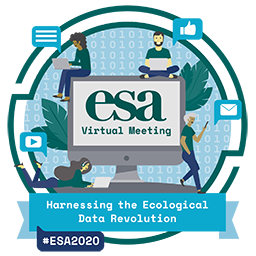Attending conferences looks a little bit different in the era of COVID-19, but that’s not stopping the Arctic Data Center from sharing learning opportunities and participating in the larger conversations about data preservation, archival, and re-use. Under normal circumstances, researchers can find us at the Data Help Desk booth at the Ecological Society of America (ESA) Annual Meeting as well as giving various presentations throughout the meeting. The only difference this year is that no one has to navigate through a busy exhibit hall to find us – instead, we’ll be recording our presentations so that researchers can have them at their fingertips, whenever and wherever folks have an internet connection.



We are in the virtual exhibit hall, and we invite you to visit our virtual booth as well as to complete the ESA scavenger hunt! Scavenger hunt prizes from ESA will include memberships and other goodies including water bottles, hoodies, and the 2020 Virtual Annual Meeting t-shirt.
Arctic Data Center staff will be convening the following sessions and giving the following talks, some of which have a LIVE component. Arranged by date of the Live Q&A.
WK 29 – Practical Data Management
S. Jeanette Clark, MS | Projects Data Coordinator
Tune in for the LIVE Q&A on August 3rd from 10:00am – 10:30am PT.
Graduate students in ecology are well versed in research methodologies, including the collection of ecological data and statistical analyses. Yet within existing courses, there is often less emphasis on effective management of the collected data. The format that is convenient for collecting data in the field is almost never convenient for storing or analyzing data. Further, widespread use of powerful spreadsheet tools such as Excel can inadvertently lead to changes in data and loss of important original observations. This workshop will introduce the concepts of relational data modeling through a mix of instructional presentation and hands on activity, with an emphasis on real world examples and making research more reproducible. Using a relational data model creates a “tidy” data structure, which makes data easier to search and filter, document, and analyze. Participants will learn the principles of tidy data, how to recognize untidy data, how to tidy their data and how having tidy data can set them up for success in analysing, documenting, and reusing their data.
Search, discovery, access and use of multi-scale ecological data for research and synthesis
Dr. Amber E. Budden | Co-PI
Tune in for the LIVE Q&A on August 4th from 12:30pm – 1:00pm PT.
In: SYMP 20 – Mobilizing Open Ecological Data and Tools to Address Continental and Global Challenges
Addressing grand challenge questions requires exploration at broad spatial, geographic and temporal scales, facilitated through easy access to distributed, heterogeneous data. DataONE is an interoperable, federated network of data repositories providing open, persistent, robust, and secure access to well-described and easily discovered data about life and the environment. Across the last decade, DataONE has developed a comprehensive search and discovery platform exposing over 1.2M data files; tools and services that support research reproducibility, transparency and credit; and data management training and resources to enhance data literacy. Through these and aligned activities, DataONE has improved interoperability across a broad coalition of data repositories and enhanced data practices across a diverse community of researchers, data managers, and data librarians. In this talk, I highlight key services that enable researchers to effectively search, discover, access and use data across the DataONE network. I present best practices for data citation and discuss ongoing work focussed on maximizing the value and impact of research data in an increasingly complex, diversified data discovery and use landscape.
There’s tons of great data out there, ontologies help you understand it
S. Jeanette Clark, MS | Projects Data Coordinator
Tune in for the LIVE Q&A on August 5th from 9:30am – 10:00am PT.
In: INS 18 – Reusing Ecological Data to Answer New Questions – Persistent Problems and Promising Progress
Reproducibility and synthesis of scientific insights depend on researchers having access to other researchers’ data. Preservation enables researchers to potentially access relevant information, however, data discovery and interpretation remain a major hurdle. Here we demonstrate how the NSF Arctic Data Center (arcticdata.io) research data repository is extending its metadata services by adopting essential Semantic Web technologies (such as formal concept vocabularies) to create a more transparent, interoperable, and re-usable scientific data commons. Arctic Data Center practices can be adopted by other repositories because semantic annotation in general is not limited to a specific metadata language.
SS 5 – Creating Effective Data Management Plans for Ecological Research
Dr. Amber E. Budden | Co-PI
Tune in for the LIVE Q&A on August 6th from 12:30pm – 1:00pm PT.
Are you preparing a research proposal or initiating a research project? Increasingly, institutions as well as funders are requiring that proposals and research projects include a comprehensive plan that describes how the data will be effectively managed during the life of the project and beyond. Advance planning for data management is good practice; stewardship of earth depends on stewardship of the data about earth and life on it. This session introduces participants to the critical components of effective data management plans, with consideration of the ways in which your plan can be tailored to the size, duration, and breadth of your project. Participants will be introduced to the DMPTool, a tool that provides plan templates that can be adapted to meet individual needs, in addition to being guided through a series of examples that span the breadth of ecological research projects. Speakers will highlight an array of online resources that point to exemplary plans, best data practices for all phases of the data life cycle (e.g., data acquisition, quality assurance/quality control, data exploration, analysis, visualization, preservation, and sharing), and additional instructional materials and resources that will enable participants in developing their own data management plans. Designed to be interactive in nature, participants will have the opportunity to step through the data management planning process in real time.
Managing sensitive qualitative data from social science fields for integrative research
Erin McLean, MS | Community Engagement and Outreach Coordinator
In: COS 233 – Big Data In Ecology – Training, Education, or Outreach 2
In this presentation, we provide an overview of the community-based approach to handling sensitive data and highlight the outcomes of a workshop focused on social science data best practices. We discuss the challenges of handling sensitive data, whether human subject research or endangered species location, and address and assuage real and perceived roadblocks of participation in research sharing activities. We outline best practices for social scientists and ecologists to follow when submitting their data and metadata to repositories for re-use and preservation, including strategies to format data so that they can be more easily compared, discovered, and re-used. A wider availability of social science and natural science data, metadata, and software in long-term repositories enables the scientific community as a whole to distribute and synthesize interdisciplinary data to answer large-scale research questions in ecology and beyond.
Career Central
The Arctic Data Center is part of the Data Help Desk effort at ESA as well, and will be giving talks targeted to early career researchers as part of that effort. Everyone is welcome to attend!
CC 5 – Data Help Desk: So Much Data, So Little Time!
Dr. Amber E. Budden | Co-PI
Erin McLean, MS | Community Engagement and Outreach Coordinator
Tune in for the LIVE Q&A on August 4th from 9:30am – 10:00am PT.
Erin will give a three minute lightning talk introducing the Arctic Data Center and our holdings, and Amber will give a three minute lightning talk introducing the DataONE network and how to search for data within the member nodes. Other repositories will be giving their lightning talks as well.
Cleaning data and creating tidy data structures to facilitate reproducible research
S. Jeanette Clark, MS | Projects Data Coordinator
Tune in for the LIVE Q&A on August 5th from 9:30am – 10:00am PT.
In: CC 6 – Data Help Desk: Using Data
Join us to learn how tidy data concepts can make your analysis easier and improve reproducibility. This session describes how to deal with inconsistencies, missing values, entry errors, multiple values in single columns, and many other data issues. Demonstrations will use R and Open Refine.
How to create a comprehensive metadata record
S. Jeanette Clark, MS | Projects Data Coordinator
Tune in for the LIVE Q&A on August 6th from 9:30am – 10:00am PT.
In: CC 7 – Data Help Desk: Sharing Data
Quality metadata enhances the discovery of your data and facilitates reproducible research. Learn the principles of creating a comprehensive metadata record.
Have a fun and productive virtual meeting, and we hope to see you at one of our talks!
